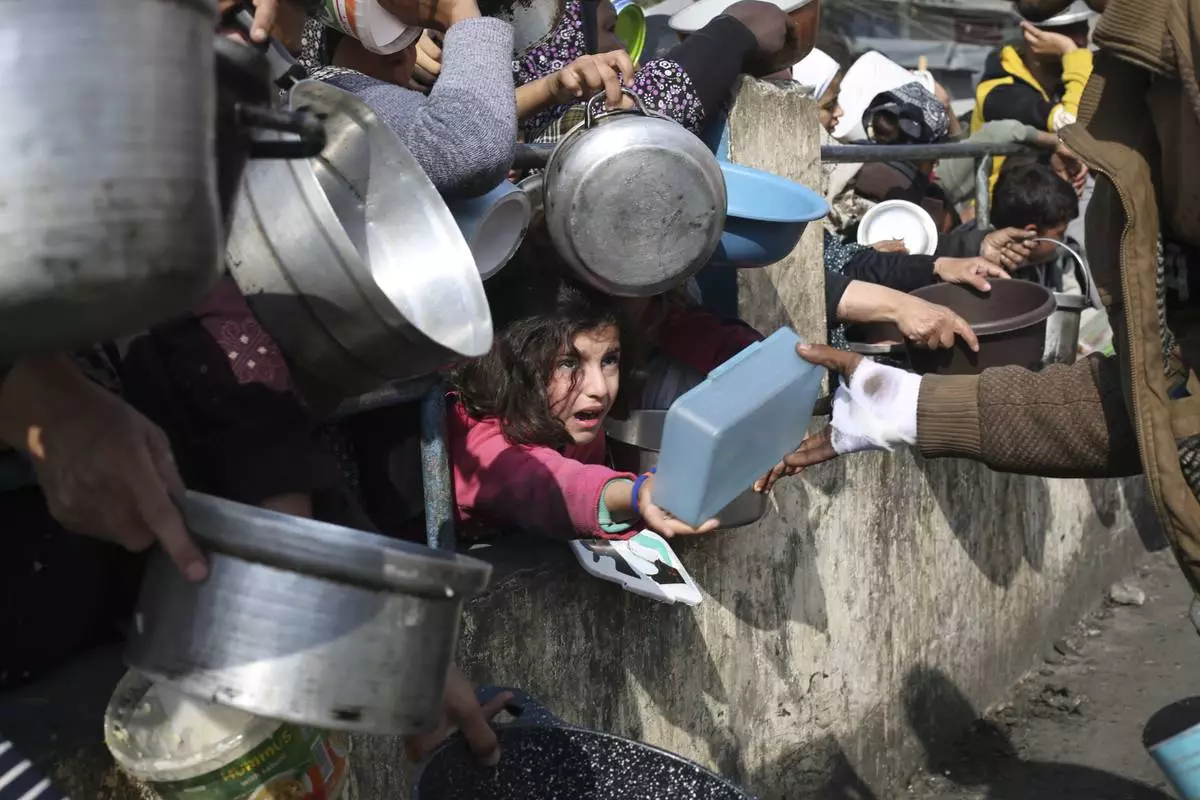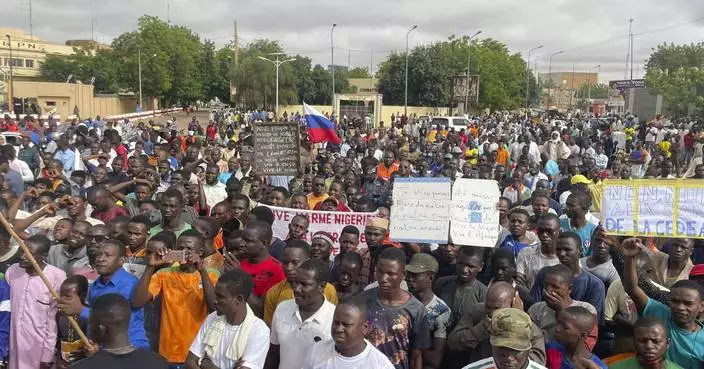Trump administration bargainers offered a one-year budget freeze and said Democratic spending demands remained too high as talks with congressional leaders aimed at averting deep cuts in defense and domestic programs this autumn seemed no closer to resolution.
Firing back, Democrats said White House involvement in the negotiations was hindering progress and rejected the proposed freeze.
The exchange suggested the two sides were not near a handshake to avert automatic cuts and instead boost both defense and domestic programs, perhaps for two years. Without some agreement, overall spending would be slashed by $125 billion starting Oct. 1, when the federal fiscal year begins, a roughly 10 percent reduction in agency budgets that both parties consider too draconian.
Emerging from a bargaining session in House Speaker Nancy Pelosi's office that lasted over an hour, Treasury Secretary Steven Mnuchin said that without an accord, the White House was prepared to prevent the automatic cut but force agencies to live with a less severe, one-year extension of this year's budget.
Mnuchin said the administration would also agree to extend the federal debt limit for a year. The government is projected to deplete its legal ability to borrow money after the summer, which would prompt an unprecedented failure by the government to repay its debt that could rattle the world's economy.
"The president has every intention of keeping the government open and keeping the soundness of the full faith and credit of the government," Mnuchin told reporters. He said both sides agreed not to hold the debt limit "hostage to spending."
In a joint statement after the meeting, Pelosi, D-Calif., and Senate Minority Leader Chuck Schumer, D-N.Y., bristled at White House involvement in the negotiations. They said Democrats "are committed" to working with congressional Republicans to avert automatic spending cuts, the constraints of a budget freeze and the threat of a federal default.
"If the House and Senate could work their will without interference from the President, we could come to a good agreement much more quickly," the two Democrats said.
Schumer later told reporters that "unfortunately" the White House has joined the talks.
"Leader McConnell is just in obeisance to the White House, and so that's where we're stuck right now," Schumer said, referring to his Republican counterpart, Senate Majority Leader Mitch McConnell of Kentucky.
Schumer also said a one-year freeze "is bad policy, it's bad politics and it's a fall back. We should be negotiating a bill."
Democrats have been pushing for increased spending for domestic programs, not a freeze, as a tradeoff for the big Pentagon increases that President Donald Trump and congressional Republicans are demanding.
Acting White House chief of staff Mick Mulvaney, exiting the negotiating session, said Democrats had actually increased their demand for domestic spending since the last bargaining session in May to $647 billion, which he said is $8 billion above their previous offer.
"So you tell me if things are moving in the right direction. Last time I checked, that's not how you compromise," Mulvaney said.
Democrats made no new spending offer Wednesday and mentioned the $647 billion figure to note the total price tag of spending bills the House has produced, said a Democrat familiar with the talks who spoke on condition of anonymity to describe the bargaining.
Also Wednesday, the Democratic-controlled House passed a $1 trillion spending bill that amounts to an opening bid in the guns vs. butter fight with the Trump administration.
The House voted along party lines to pass the bill, which blends the military spending that's a priority for Republicans with Democratic-sought funding increases for health and education programs.
The House-passed bill far exceeds Trump's budget request for domestic programs, attracting a White House veto threat, and denies him his full Pentagon budget increase.
It also contains policy "riders" related to abortion and other hot-button issues that drove away potential GOP supporters, though Democrats sidestepped a potentially divisive battle by preserving a longtime ban on taxpayer-financed abortion.
The bill boosts the Pentagon budget by about $16 billion over current levels, about a 2% increase, while giving health, education and labor programs an almost 7% boost. Those numbers would have to balance out more to gain Trump's signature.
Action on the measure comes as Democrats have been struggling to get their message out above the political din of Trump's Washington. The bill wraps four of the 12 annual spending measures into one, and Democrats are boasting of gains for Head Start, health research and fighting the opioid epidemic, among the myriad programs covered by the measure.
It also contains provisions to block Trump from reassigning military appropriations to fund his border wall, and contains significantly more money for family planning, preschool education and child care, and research into dangerous diseases.
WASHINGTON (AP) — Israel this week briefed Biden administration officials on a plan to evacuate Palestinian civilians ahead of a potential operation in the southern Gaza city of Rafah aimed at rooting out Hamas militants, according to U.S. officials familiar with the talks.
The officials, who were not authorized to comment publicly and requested anonymity to speak about the sensitive exchange, said that the plan detailed by the Israelis did not change the U.S. administration’s view that moving forward with an operation in Rafah would put too many innocent Palestinian civilians at risk.
Israeli Prime Minister Benjamin Netanyahu has vowed to carry out a military operation in Rafah despite warnings from President Joe Biden and other western officials that doing so would result in more civilian deaths and worsen an already dire humanitarian crisis.
The Biden administration has said there could be consequences for Israel should it move forward with the operation without a credible plan to safeguard civilians.
“Absent such a plan, we can’t support a major military operation going into Rafah because the damage it would do is beyond what’s acceptable,” U.S. Secretary of State Antony Blinken said late Friday at the Sedona Forum, an event in Arizona hosted by the McCain Institute.
Some 1.5 million Palestinians have sheltered in the southern Gaza city as the territory has been ravaged by the war that began on Oct. 7 after Hamas militants attacked Israel, killing 1,200 people and taking about 250 hostages.
The United Nations humanitarian aid agency on Friday said that hundreds of thousands of people would be “at imminent risk of death” if Israel moves forward with the Rafah assault. The border city is a critical entry point for humanitarian aid and is filled with displaced Palestinians, many in densely packed tent camps.
The officials added that the evacuation plan that the Israelis briefed was not finalized and both sides agreed to keep discussing the matter.
White House press secretary Karine Jean-Pierre told reporters on Friday that no “comprehensive” plan for a potential Rafah operation has been revealed by the Israelis to the White House. The operation, however, has been discussed during recent calls between Biden and Netanyahu as well as during recent virtual talks with top Israeli and U.S. national security officials.
“We want to make sure that those conversations continue because it is important to protect those Palestinian lives — those innocent lives,” Jean-Pierre said.
The revelation of Israel's continued push to carry out a Rafah operation came as CIA director William Burns arrived Friday in Egypt, where negotiators are trying to seal a cease-fire accord between Israel and Hamas.
Hamas is considering the latest proposal for a cease-fire and hostage release put forward by U.S., Egyptian and Qatari mediators, who are looking to avert the Rafah operation.
They have publicly pressed Hamas to accept the terms of the deal that would lead to an extended cease-fire and an exchange of Israeli hostages taken captive on Oct. 7 and Palestinian prisoners in Israeli jails.
Hamas has said it will send a delegation to Cairo in the coming days for further discussions on the offer, though it has not specified when.
Israel, and its allies, have sought to increase pressure on Hamas on the hostage negotiation. Signaling that Israel continues to move forward with its planning for a Rafah operation could be a tactic to nudge the militants to finalize the deal.
Netanyahu said earlier this week that Israeli forces would enter Rafah, which Israel says is Hamas’ last stronghold, regardless of whether a truce-for-hostages deal is struck. His comments appeared to be meant to appease his nationalist governing partners, and it was not clear whether they would have any bearing on any emerging deal with Hamas.
Blinken visited the region, including Israel, this week and called the latest proposal “extraordinarily generous” and said “the time to act is now.”
In Arizona on Friday, Blinken repeated remarks he made earlier this week that "the only thing standing between the people of Gaza and a cease-fire is Hamas.”

The Chahine family prepares to bury two adults and five boys and girls under the age of 16 after an overnight Israeli strike in Rafah, southern Gaza Strip, Friday, May 3, 2024. An Israeli strike on the city of Rafah on the southern edge of the Gaza Strip killed several people, including children, hospital officials said Friday. (AP Photo/Ismael Abu Dayyah)

FILE - Palestinians line up for free food during the ongoing Israeli air and ground offensive on the Gaza Strip in Rafah, Jan. 9, 2024. A top U.N. official said Friday, May 3, 2024, that hard-hit northern Gaza was now in “full-blown famine" after more than six months of war between Israel and Hamas and severe Israeli restrictions on food deliveries to the Palestinian territory. (AP Photo/Hatem Ali, File)

Palestinians rescue a woman survived after the Israeli bombardment on a residential building of Abu Alenan family in Rafah, southern Gaza Strip, early Saturday, May 4, 2024. (AP Photo/Ismael Abu Dayyah)

President Joe Biden walks across the South Lawn of the White House as he talks with White House press secretary Karine Jean-Pierre Thursday, May 2, 2024, in Washington, after returning from a trip to North Carolina. (AP Photo/Mark Schiefelbein)













